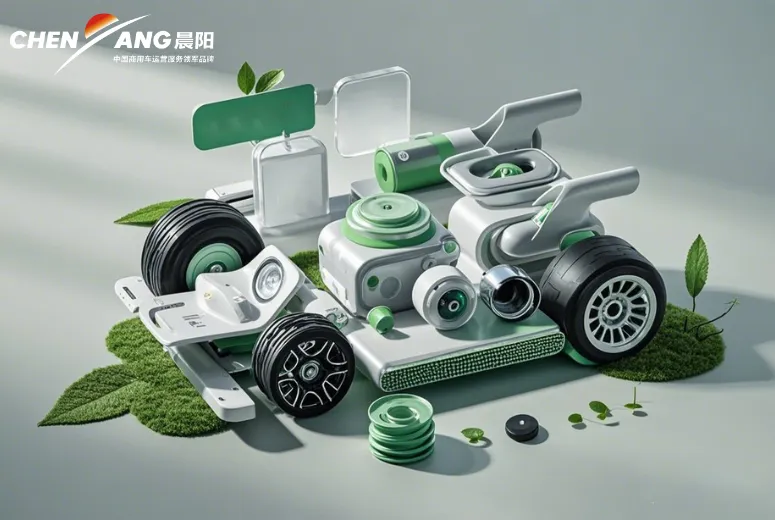Eco-Friendly Auto Parts: How Recycled Materials Are Transforming the Industry
The automotive industry is undergoing a green revolution, and eco-friendly auto parts are at the forefront of this transformation. By incorporating recycled materials into manufacturing processes, automakers are reducing environmental impact, cutting waste, and paving the way for a more sustainable future. This shift not only benefits the planet but also introduces innovative solutions that enhance vehicle performance and appeal to environmentally conscious consumers.

The Rise of Sustainable Manufacturing in the Automotive Sector About Auto Parts
Sustainability has become a key priority for the automotive industry, driven by growing consumer awareness and stricter environmental regulations. Traditional auto manufacturing processes often involve resource-intensive practices that contribute to carbon emissions and waste. By integrating recycled materials, automakers can significantly reduce these impacts.
Recycled materials such as plastics, metals, and rubber are now being repurposed to create high-quality auto parts. This approach minimizes reliance on virgin resources, reduces landfill waste, and supports a circular economy. As a result, sustainable manufacturing has transitioned from being a niche initiative to a mainstream strategy embraced by leading carmakers.
Key Recycled Materials in Auto Parts
Various recycled materials are finding their way into modern vehicles, contributing to both functionality and eco-friendliness. Recycled plastics are being used for interior components like dashboards, door panels, and seat fabrics, offering lightweight and durable solutions. These materials often originate from post-consumer waste, such as discarded water bottles or packaging materials.
Recycled metals, including aluminum and steel, are playing a crucial role in structural components and engine parts. Aluminum, in particular, is highly valued for its light weight and strength, making it ideal for improving fuel efficiency. Similarly, recycled rubber is being utilized to produce tires, gaskets, and seals, offering excellent performance while reducing the environmental footprint.
Innovations in Recycling Technology About Auto Parts
Advancements in recycling technology are driving the adoption of eco-friendly autoparts. Techniques such as chemical recycling and closed-loop processes are enabling manufacturers to break down materials into their basic components and reintroduce them into the production cycle. These methods ensure that recycled materials maintain their quality and performance, making them suitable for demanding automotive applications.
For example, companies are developing innovative processes to recycle carbon fiber, a material known for its strength and light weight. Traditionally challenging to recycle, carbon fiber is now being reclaimed for use in lightweight structural components, helping to reduce vehicle weight and improve energy efficiency.
Benefits of Recycled Auto Parts
Using recycled materials in car accessories offers numerous advantages, both for the environment and the automotive industry. The most obvious benefit is the reduction in waste and resource consumption. By diverting materials from landfills and repurposing them, manufacturers can conserve natural resources and lower their carbon footprint.
Eco-friendly auto parts also align with consumer preferences, as more buyers seek sustainable options. Vehicles featuring recycled components appeal to environmentally conscious customers and enhance a brand’s reputation for sustainability. Moreover, the lightweight nature of many recycled materials, such as plastics and aluminum, contributes to improved fuel efficiency and lower emissions.
Challenges and Future Outlook About Auto Parts
Despite the progress, challenges remain in the widespread adoption of recycled materials in auto parts. Ensuring a consistent supply of high-quality recycled materials is a significant hurdle, as it requires robust recycling infrastructure and efficient collection systems. Additionally, integrating recycled materials into existing production processes can involve initial costs and technical complexities.
However, the future is promising. Automakers are increasingly investing in research and development to overcome these challenges and scale up the use of recycled materials. Partnerships with recycling firms and the development of new recycling technologies are further accelerating this trend.
As the industry moves towards electrification, the demand for sustainable materials is expected to grow. Electric vehicles (EVs) present unique opportunities for recycled components, particularly in battery manufacturing and lightweight construction. By embracing innovation and collaboration, the automotive sector can continue to drive positive environmental change.
-
Low Maintenance + High Availability of Ownership for Mining Dump TruckNewsJul.17,2025
-
Drum Drive Axle + Air Suspension for Electric Tractor TruckNewsJul.17,2025
-
33m Boom + Full Hydraulic Outriggers: Narrow-Site Construction Practices of Mixer Pump TruckNewsJul.17,2025
-
18L Large Drum + Extended Drain Interval of Gear Oil for Heavy Duty TrucksNewsJul.17,2025
-
13m Cargo Space + Polyurethane Insulation: Long-Term Cold Chain Protection Solutions for Refrigerated Semi-Trailers for SaleNewsJul.17,2025
-
10T Water Tank + 2.5MPa Fire Pump Efficiency Analysis of Water Tank Fire TruckNewsJul.17,2025
Popular products

























